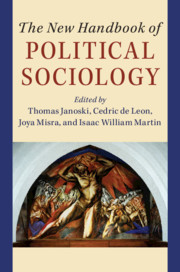Book contents
- The New Handbook of Political Sociology
- The New Handbook of Political Sociology
- Copyright page
- Dedication
- Contents
- Tables
- Figures
- Contributors
- Acknowledgments
- Introduction
- I Theories of Political Sociology
- II Media Explosion, Knowledge as Power, and Demographic Reversals
- III The State and Its Political Organizations
- IV Civil Society: The Roots and Processes of Political Action
- V Established and New State Policies and Innovations
- 30 The Evolution of Fiscal and Monetary Policy
- 31 Welfare State Policies and Their Effects
- 32 Sexuality, Gender, and Social Policy
- 33 Migration, Asylum, Integration, and Citizenship Policy
- 34 Cosmopolitanism and Political Sociology
- 35 War, States, and Political Sociology
- VI Globalization and New and Bigger Sources of Power and Resistance
- Index
- References
34 - Cosmopolitanism and Political Sociology
World Citizenship, Global Governance, and Human Rights
from V - Established and New State Policies and Innovations
Published online by Cambridge University Press: 22 February 2020
- The New Handbook of Political Sociology
- The New Handbook of Political Sociology
- Copyright page
- Dedication
- Contents
- Tables
- Figures
- Contributors
- Acknowledgments
- Introduction
- I Theories of Political Sociology
- II Media Explosion, Knowledge as Power, and Demographic Reversals
- III The State and Its Political Organizations
- IV Civil Society: The Roots and Processes of Political Action
- V Established and New State Policies and Innovations
- 30 The Evolution of Fiscal and Monetary Policy
- 31 Welfare State Policies and Their Effects
- 32 Sexuality, Gender, and Social Policy
- 33 Migration, Asylum, Integration, and Citizenship Policy
- 34 Cosmopolitanism and Political Sociology
- 35 War, States, and Political Sociology
- VI Globalization and New and Bigger Sources of Power and Resistance
- Index
- References
Summary
This chapter examines the implications of cosmopolitanism for the subfield of political sociology. Owing to its roots in ongoing debates on how globalization has altered power relations in the contemporary world, cosmopolitanism cuts across the subfield of political sociology in instructive ways. Though interdisciplinary in nature, cosmopolitan research contains important insights for the sociological study of politics at the global, national, and local levels (Archibugi 2003; Brown and Held 2010). While this chapter focuses on how cosmopolitanism contributes to our understanding of world citizenship, global governance, and human rights, it nonetheless points to the roles of states (in their foreign and domestic policies) and civil society actors, including social movement organizations (SMOs) and NGOs, in advancing (or blocking) cosmopolitan objectives.
- Type
- Chapter
- Information
- The New Handbook of Political Sociology , pp. 909 - 923Publisher: Cambridge University PressPrint publication year: 2020

